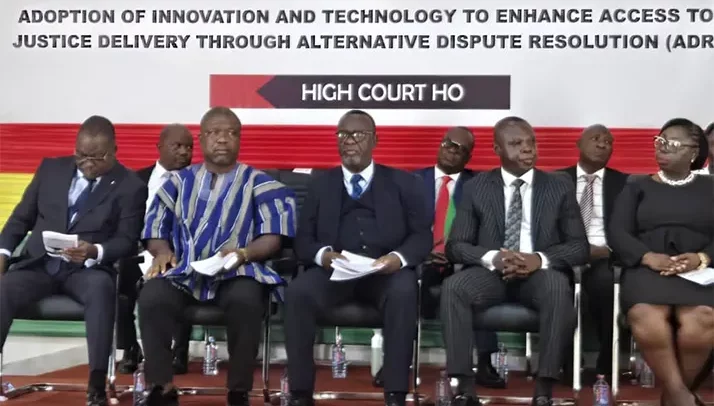Chief Justice Paul Baffoe-Bonnie with other Justices at the ADR Week launch
The Chief Justice, His Lordship Justice Paul Baffoe-Bonnie, has urged stakeholders in the justice sector to fully embrace technological innovation as a critical tool for enhancing access to justice and strengthening Alternative Dispute Resolution (ADR) in Ghana.
Launching the 2025 ADR Week at the Ho High Court premises on Monday, the Chief Justice stressed that Ghana must adapt to global shifts in dispute resolution to remain effective and responsive.
The event brought together Justices of the Supreme Court, Court of Appeal, High Court, members of the Bar, mediators, court staff, and justice-sector stakeholders.
Justice Baffoe-Bonnie noted that ADR has become an indispensable complement to the traditional court system due to its speed, cost-effectiveness, flexibility, and ability to preserve relationships in families, workplaces and business settings.
“We are committed to integrating ADR into our wider justice sector digitalisation agenda to build a system that is inclusive, secure, and responsive to the needs of the Ghanaian public,” he disclosed.
He announced plans for stronger collaboration among mediators, judges, ICT professionals and development partners to support online and virtual dispute resolution, adding that all justice actors including judges, lawyers, court staff and the media must work together to boost public confidence in ADR.
The Chief Justice also commended mediators for their continued dedication and appealed to the media to deepen public education on the benefits and legitimacy of ADR.
The President of the Volta and Oti Regional Bar Association and Head of the Office of the Attorney General in Ho, Moses Ayine Asampoa, reiterated the need for a decisive national shift toward embedding technology in Ghana’s justice architecture, particularly in ADR processes.
“Technology is the bridge that will catapult ADR from a complementary system to a truly mainstream mechanism of justice delivery,” he stated.
Mr. Asampoa underscored the potential of video-assisted mediation, digital filing, electronic scheduling and virtual hearings to reduce delays, cut transportation costs and expand access to justice across remote communities. He encouraged lawyers to prioritise ADR and refrain from unnecessary litigation, stressing that legal ethics require the avoidance of avoidable disputes.
He further urged judges to make timely referrals to ADR, especially in land disputes where mediation is mandatory, and called for the establishment of a mediation unit within the Office of the Attorney General to address disputes between state institutions.
Her Ladyship Justice Angelina Mensah Homiah, Justice of the Court of Appeal and the Justice in Charge of ADR, reaffirmed the Judiciary’s commitment to strengthening the nationwide adoption of ADR.
She disclosed that the recently completed ADR sensitisation tour of the Volta and Oti regions demonstrated rising public interest in ADR, but also highlighted the need for expanded structures.
Justice Mensah Homiah stated that although the current Court-Connected ADR (CCADR) system requires parties to file cases before being referred to mediation, the ADR Act, 2010 (Act 798) provides for an independent ADR Centre under Section 114. When fully operationalised, the centre will have district, regional and national offices where citizens can request ADR services without first initiating court action.
“This decentralised structure will significantly ease pressure on the courts. If a lot of cases are settled at that level, the caseload of the courts would be reduced,” she stated.
She revealed that more than 37,000 cases have been successfully settled through CCADR over the last 20 years, demonstrating its impact. However, she stressed that improvement is still needed, and the Judiciary will continue partnering with institutions such as Legal Aid, the Social Welfare and Gender Department (SWaRG) and the Ghana Bar Association.
She disclosed that about 400 newly recruited mediators will soon undergo training and be deployed across courts nationwide, while experienced mediators will be engaged to handle complex disputes.
The nationwide sensitisation tour forms part of the Judiciary’s broader agenda to make ADR more credible, accessible and community-friendly.
FROM Daniel K. Orlando, Ho


